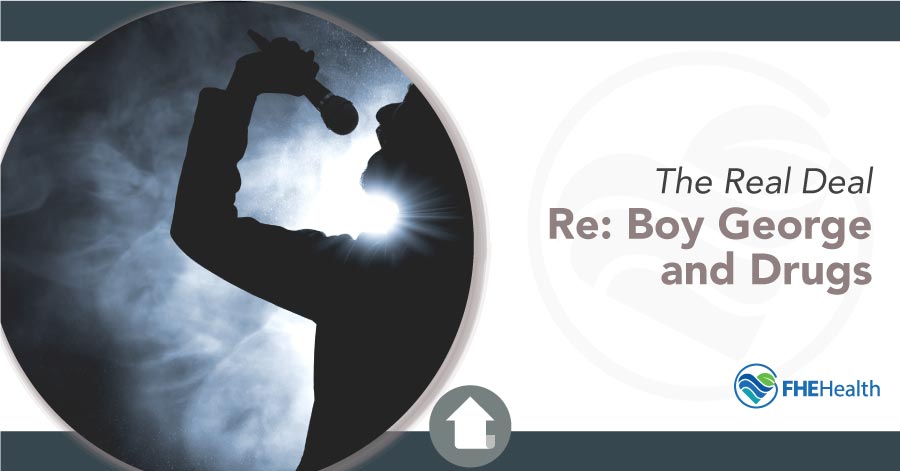
One of the defining pioneers of 80s pop culture was Boy George, flamboyant leader of the band Culture Club, formed in London in 1981. Known for its contributions to new wave, pop and what the media of the time called “blue-eyed soul,” Culture Club helped shape the era’s sound. In the background, though, band members struggled with mental health and addiction issues that were compounded by their meteoric rise to fame.
After undertaking serious efforts at recovery, Boy George has achieved more than a decade of sobriety starting in 2008. The singer has been publicly frank since then about his battles with substance abuse. His experiences are relevant to more than just celebrity life; they hold lessons for anyone struggling with addiction.
Boy George, Heroin and Other Drugs and MTV Mega-Stardom
A common theme in stories of celebrity battles with addiction is the surreal effect that sudden mega-fame can have on people’s lives. Combine that with the effects of having to face and surmount violent experiences and trauma, and the pitfalls can become extremely difficult to avoid. Boy George vividly describes encountering both these realities.
He said about the abrupt transition to celebrity, “The kind of fame that I experienced in the early part of my life was so extreme. It’s impossible to even explain what that was like. I wasn’t ready for it.” He added, “It also distracted me from what I was doing musically. I was so busy being ‘Boy George’ that I stopped being an artist.”
The world also wasn’t nearly as welcoming a place for gender-bending pioneers like George as the scale and glamor of his public image seemed to imply. “[The] world was a very aggressive place then. People would punch you [for looking different]. People would walk up to you and punch you in the face. That happened quite a lot to me, but it didn’t stop me wanting to dress up. It made me want to dress up more. Bizarre.”
That world, as fascinated with George in the early years as some parts of it were violently hostile to him, demanded every ounce of his energy to maintain the larger-than-life image that fronted Culture Club. That mixture of overwhelming demands, surreal celebrity, and the traumatic intrusions of darker realities formed a dangerous mix that could easily drive addiction. The singer would later describe suffering from intense panic attacks and general anxiety during the 90s.
In a common paradox of celebrity, the world was just as eager to watch George’s life consume itself as it was to see him rise. Three years after Culture Club’s debut, popular culture was already moving on, and his struggles with addiction were beginning in earnest. And when he was finally outed publicly as a heroin addict in 1986, he got a gleefully sensationalized savaging in press outlets such as Rolling Stone:
“Shock. How else could one respond to the revelation that Boy George was now addicted to heroin? This was not some openly decadent hedonist like Keith Richards … [he] was the harmless, lovable windup doll of pop, a cartoonlike fantasy figure … the pop star whom everyone from your grandmother to your little sister could like.”
The Road to Recovery and Career Revival
Rolling Stone’s “shock” rings false in retrospect. It’s hardly as though drug use in the entertainment industry was a revelation in the mid-80s. Fortunately, although the star’s journey to recovery would be difficult, he was eventually able to surmount these early experiences and the storms of public judgment that came with them.
Through multiple drug-related arrests, as the popularity of Culture Club receded, Boy George knew he had a problem. In contrast, the “rock bottom” moment that finally persuaded him to seek help wasn’t dramatic. Nevertheless, the road to recovery was a long one.
In his own words: “In recovery, we talk about rock bottoms, you know? And everybody has their own rock bottom . . . For some people, it could be something mundane. For me, it was literally just one morning, waking up, and just having this kind of overwhelming feeling that I was really, truly unhappy, and I needed to do something about it. I remember one of the things I said to myself was ‘If you’re going to be Boy George, you might as well try and be the best Boy George you can be.'”
The singer’s commitment to recovery from that point, which he identifies as a specific date in 2008, produced what he describes as the best years of his life. Remarkably, Culture Club was even able to revive and produce music again, releasing its first album in two decades in 2018. And there’s a biopic of George himself planned for the near future.
As he said to a fellow 10-year veteran of recovery on The Voice Australia: “It’s like, you get through the other side and you get a life beyond your wildest dreams, you know because recovery does set you free.”
What Boy George’s Story Can Teach Us
When figures in the public eye talk openly about addiction and mental health struggles, it can have a big impact. The anxiety disorder that drove much of Boy George’s addiction is the most common mental illness in the United States. Knowing there’s someone successful who still faces such challenges can be an inspiration to people battling their demons.
Boy George benefited from the kind of 12-step recovery process, and very likely from medical detox, that has helped so many others find peace. It’s the same kind of recovery process we offer at FHE Health.
If you’re suffering from anxiety or trauma and currently fighting an addiction of your own, the good news is that there’s help. Medical detoxification at a facility like FHE Health can train your body for sobriety, and you can learn ways to cope with your triggers and find the path to long-term recovery. Contact us today at (833) 596-3502. Our compassionate counselors are standing by to take your call around the clock.






